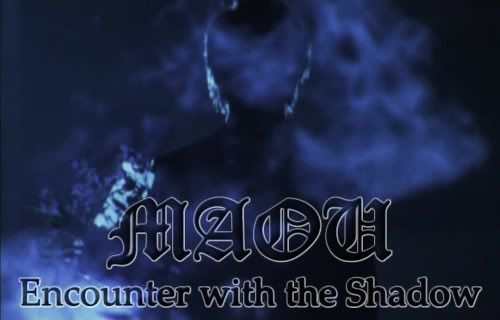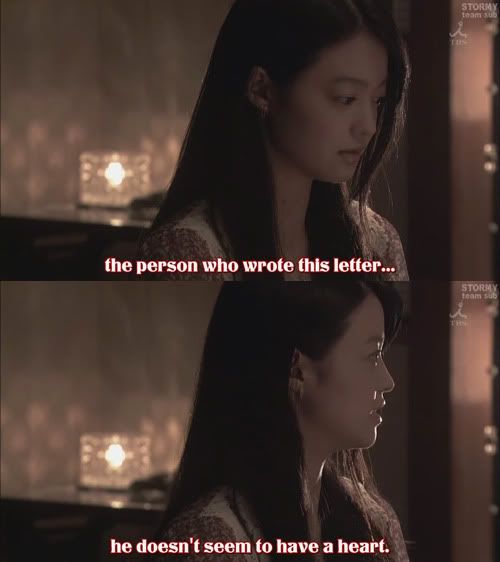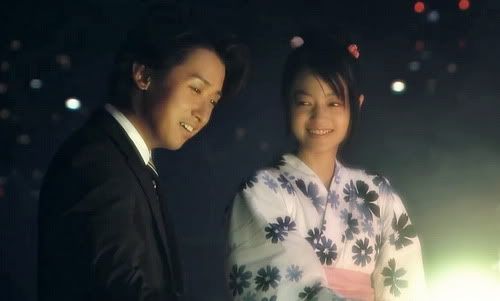REVIEW: Maou: Encounter with the Shadow. Part 2/3.
REVIEW: Maou: Encounter with the Shadow. Part 1/3
___________________________
This part will be Manaka Tomoo-centric because I would like to draw a parallel of Maou character with the protagonist of Oscar Wilde’s fairy tale.

II. Shadow in Oscar Wilde’s The Fisherman and his Soul and Maou
There is another interesting interpretation of the concept of Shadow in a fairy tale by Oscar Wilde, The Fisherman and his Soul. Although Wilde’s storyline has different accents and issues at hand, and the life and reasoning of the Fisherman does not correlate directly to Manaka Tomoo’s but when I was watching the first episode, Shiori said one thing that made this fairy tale one of the lenses through which I was looking at the drama from then on.

Wilde’s Fisherman sends away his soul for the love of the fair Little Mermaid (mermaids have no soul and the Fisherman, being human, can only unite with her in the sea if he gets rid of his soul). To do this, he has to cut away his shadow with a knife. Because “what men call the shadow of the body is not the shadow of the body, but is the body of the soul.”
When he performs the ritual, the Shadow-soul asks the Fisherman to give it his heart “for the world is very cruel, and I am afraid”, but he wouldn’t listen. The Shadow leaves and goes to see the world but without a heart it only learns the world’s dark ways. Without a heart, the soul grows pitch-dark and evil, like the portrait of Dorian Gray that reflects the ugliness of the things Dorian does.
Every year, the Shadow comes back to beg the Fisherman let it in again, tempting him with the things it saw, with wisdom and riches.
The Fisherman betrays the Mermaid on the third year, when the Shadow tempts him with a story about a beautiful dancer girl with bare feet. He goes out of the sea and lets the Shadow-soul enter him.
Instead of taking him to the barefooted dancer, the Soul takes the Fisherman on a shadow journey: makes him steal, hit an innocent child and kill the merchant who let them in for the night. Terrified of doing the evil things he didn’t intend to do, the Fisherman tries to send the Shadow away again, but in vain. “Once in his life may a man send his Soul away, but he who receiveth back his Soul must keep it with him for ever, and this is his punishment and his reward.”
The Fisherman calls to the Mermaid but she wouldn’t answer to him anymore. His heart is still full of love and the Shadow-soul can find no way to enter. When the Fisherman wishes to open his heart to the Shadow, the Mermaid’s body is washed to the shore. The lovers unite in death when the Fisherman’s heart breaks and the soul enters him finally being whole with the body again.
Two main notions in this fairy tale are Eros and Logos. Eros (no erotic subtext, please) being the universal power of love that drives the Fisherman to forsake his soul, his love for the Mermaid. We also see the “negative Eros”, the temptation and lust that bring the Fisherman to betrayal. Logos here is only displayed as “negative Logos” being the dark knowledge the Shadow-soul acquires in its travels.
Manaka Tomoo becomes heartless Maou after literally losing everything he had in his life. He sends all the love he had in his heart away. The power that drives him is distorted Eros, the love for his brother and mother that creates a destructive yearning for revenge.
He collects all possible information on the participants of his “killing show” during the 11 years after the murder. He acquires “negative Logos”. The union with the Shadow-soul, Amano Makoto, takes place when the revenge plan starts to unfold. The murders start, and like circles on water, the circle of people who get involved in this story gets only bigger.
The Eros in its pure form is Manaka Tomoo’s feelings for Shiori and the future that she lets him see. The unattainable future that however revives his heart.
The real man behind the Shadow knows that it is the life he would choose if he could undo the evil things committed. But as the Fisherman cannot send away his Soul for the second time, likewise the avenger Shadow of Amano Makoto doesn’t let go.
In the letter Manaka Tomoo writes to Shiori before going to meet his death, he pours out his heart, unable to tell her of his feelings face-to-face.
The Shadow-soul wins in both stories, the destruction in “Maou” reaching a terrifying range. But the pure feelings and the power of love lives on in Shiori. The man she loved could not be saved but in the end, she knows that she did lead his heart out of the shadow. And even if this moment was short-lived like the light of fireworks, it was just as bright.

REVIEW: Maou: Encounter with the Shadow. Part 3/3
___________________________
Resource:
Oscar Wilde, “The Fisherman and his Soul”
Clifton Snider, "On the Loom of Sorrow: Eros and Logos in Oscar Wilde's Fairy Tales"
PS I know it’s a serious review but… after I started working with this fairy tale, Wilde’s story title dawned on me with Ohno-fisherman reference and I couldn’t unsee it ever since. There are no coincidences in this world, are there now! Still, initially, no pun was intended :)

___________________________
This part will be Manaka Tomoo-centric because I would like to draw a parallel of Maou character with the protagonist of Oscar Wilde’s fairy tale.

II. Shadow in Oscar Wilde’s The Fisherman and his Soul and Maou
There is another interesting interpretation of the concept of Shadow in a fairy tale by Oscar Wilde, The Fisherman and his Soul. Although Wilde’s storyline has different accents and issues at hand, and the life and reasoning of the Fisherman does not correlate directly to Manaka Tomoo’s but when I was watching the first episode, Shiori said one thing that made this fairy tale one of the lenses through which I was looking at the drama from then on.

Wilde’s Fisherman sends away his soul for the love of the fair Little Mermaid (mermaids have no soul and the Fisherman, being human, can only unite with her in the sea if he gets rid of his soul). To do this, he has to cut away his shadow with a knife. Because “what men call the shadow of the body is not the shadow of the body, but is the body of the soul.”
When he performs the ritual, the Shadow-soul asks the Fisherman to give it his heart “for the world is very cruel, and I am afraid”, but he wouldn’t listen. The Shadow leaves and goes to see the world but without a heart it only learns the world’s dark ways. Without a heart, the soul grows pitch-dark and evil, like the portrait of Dorian Gray that reflects the ugliness of the things Dorian does.
Every year, the Shadow comes back to beg the Fisherman let it in again, tempting him with the things it saw, with wisdom and riches.
The Fisherman betrays the Mermaid on the third year, when the Shadow tempts him with a story about a beautiful dancer girl with bare feet. He goes out of the sea and lets the Shadow-soul enter him.
Instead of taking him to the barefooted dancer, the Soul takes the Fisherman on a shadow journey: makes him steal, hit an innocent child and kill the merchant who let them in for the night. Terrified of doing the evil things he didn’t intend to do, the Fisherman tries to send the Shadow away again, but in vain. “Once in his life may a man send his Soul away, but he who receiveth back his Soul must keep it with him for ever, and this is his punishment and his reward.”
The Fisherman calls to the Mermaid but she wouldn’t answer to him anymore. His heart is still full of love and the Shadow-soul can find no way to enter. When the Fisherman wishes to open his heart to the Shadow, the Mermaid’s body is washed to the shore. The lovers unite in death when the Fisherman’s heart breaks and the soul enters him finally being whole with the body again.
Two main notions in this fairy tale are Eros and Logos. Eros (no erotic subtext, please) being the universal power of love that drives the Fisherman to forsake his soul, his love for the Mermaid. We also see the “negative Eros”, the temptation and lust that bring the Fisherman to betrayal. Logos here is only displayed as “negative Logos” being the dark knowledge the Shadow-soul acquires in its travels.
Manaka Tomoo becomes heartless Maou after literally losing everything he had in his life. He sends all the love he had in his heart away. The power that drives him is distorted Eros, the love for his brother and mother that creates a destructive yearning for revenge.
He collects all possible information on the participants of his “killing show” during the 11 years after the murder. He acquires “negative Logos”. The union with the Shadow-soul, Amano Makoto, takes place when the revenge plan starts to unfold. The murders start, and like circles on water, the circle of people who get involved in this story gets only bigger.
The Eros in its pure form is Manaka Tomoo’s feelings for Shiori and the future that she lets him see. The unattainable future that however revives his heart.
The real man behind the Shadow knows that it is the life he would choose if he could undo the evil things committed. But as the Fisherman cannot send away his Soul for the second time, likewise the avenger Shadow of Amano Makoto doesn’t let go.
In the letter Manaka Tomoo writes to Shiori before going to meet his death, he pours out his heart, unable to tell her of his feelings face-to-face.
The Shadow-soul wins in both stories, the destruction in “Maou” reaching a terrifying range. But the pure feelings and the power of love lives on in Shiori. The man she loved could not be saved but in the end, she knows that she did lead his heart out of the shadow. And even if this moment was short-lived like the light of fireworks, it was just as bright.

REVIEW: Maou: Encounter with the Shadow. Part 3/3
___________________________
Resource:
Oscar Wilde, “The Fisherman and his Soul”
Clifton Snider, "On the Loom of Sorrow: Eros and Logos in Oscar Wilde's Fairy Tales"
PS I know it’s a serious review but… after I started working with this fairy tale, Wilde’s story title dawned on me with Ohno-fisherman reference and I couldn’t unsee it ever since. There are no coincidences in this world, are there now! Still, initially, no pun was intended :)